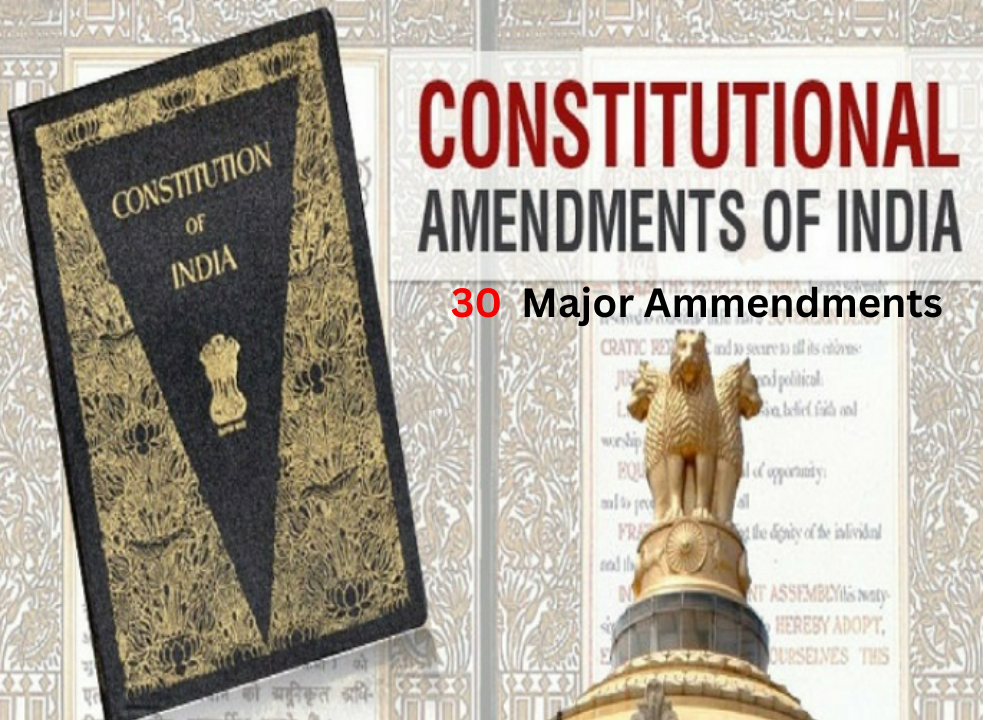Understanding the 30 Major Amendments of the Indian Constitution is imperative for students preparing for upcoming exams. These amendments reflect the evolving socio-political landscape of India and hold significant implications for governance and rights. Mastery of these amendments equips students with a comprehensive understanding of the constitutional framework, enabling them to analyze historical contexts and contemporary issues. Moreover, it fosters critical thinking skills and enhances their ability to navigate complex legal and political concepts, ensuring a solid foundation for academic success and civic engagement.

Also Read – Differences Between Lok Sabha and Rajya Sabha
30 Major Amendments of Indian Constitution
- First Amendment (1951) – The Ninth Schedule was included by this amendment.
- Second Amendment (1952) – Determined the representation of states in the Parliament.
- Seventh Amendment (1956) – By this amendment, the division of states into A, B, C and D classes was removed and they were divided into 14 states and 6 union territories.
- Tenth Amendment (1961) – Dadra and Nagar Haveli was included in the Indian Union and given them the status of a Union Territory.
- 12th Amendment (1962) – Goa, Daman and Diu were integrated into the Indian Union.
- 13th Amendment (1962) – A new Article 371 (A) was added to the Constitution, which made some special provisions for the administration of Nagaland. On December 1, 1963, Nagaland was granted the status of a state.
- 14th Amendment (1963) – Pondicherry was added to the First Schedule as a Union Territory and provided for the establishment of Legislative Assemblies in these Union Territories (Himachal Pradesh, Goa, Daman and Diu, Pondicherry and Manipur).
- 21st Amendment (1967) – ‘Sindhi’ language was added to the Eighth Schedule.
- 22nd Amendment (1968) – Parliament was empowered to establish Meghalaya as an independent state and to make provision for legislature and council of ministers.
- 24th Amendment (1971) – Parliament was given the right to amend any part of the constitution including fundamental rights.
- 27th Amendment (1971) – The five states of the North-Eastern Region namely the then Assam, Nagaland, Meghalaya, Manipur and Tripura and the two Union Territories of Mizoram and Arunachal Pradesh were constituted and a ‘North-East Frontier Council’ was established for coordination and cooperation among them.
- 31st Amendment (1974) – The maximum number of members of the Lok Sabha was fixed at 547. Of these, 545 will be elected and 2 nominated by the President.
- 36th Amendment (1975) – Sikkim was admitted to the Indian Union as the 22nd state of the Union.
- 37th Amendment (1975) – Legislature and Council of Ministers were established in Arunachal Pradesh.
- 42nd Amendment (1976) – It has been given the name of ‘Mini Constitution’. — By this, the words ‘secular’, ‘socialist’ and ‘integrity’ were added to the Preamble of the Constitution.
— Through this, 10 fundamental duties of citizens were fixed while arranging rights as well as duties.
— The term of the Lok Sabha and the Legislative Assemblies was extended by one year.
— Some new elements were added to the Directive Principles.
— Through this, education, measurement, protection of forests and wild animals and birds, these subjects were removed from the State List and placed in the Concurrent List.
— It was arranged that the emergency under Article 352 could be imposed for the whole of the country or for one or some parts of the country.
— Constitutional amendment made by Parliament was barred from being challenged in court. - 44th Amendment (1978) – Fundamental right to property was abolished and made a legal right. — The term of the Lok Sabha and the State Legislative Assemblies was again reduced to 5 years.
— The right to hear the election disputes of the President, Vice President, Prime Minister and Lok Sabha Speaker was again given to the Supreme Court and the High Court.
— Whatever advice is given to the President by the Cabinet, the President may ask the Cabinet to reconsider it, but after reconsideration, whatever advice the Cabinet gives to the President, the President will compulsorily accept that advice.
The ‘right to life and liberty of the individual’ cannot be suspended or limited by the state even in an emergency, - 52nd Amendment (1985) – The Tenth Schedule was added to the Constitution by this amendment. It seeks to put a legal stop on political defections.
- 55th Amendment (1986) – Arunachal Pradesh was granted statehood under the Indian Union.
- 56th Amendment (1987) – It provides for full statehood to Goa and to make ‘Daman and Diu’ a new union territory.
- 61st Amendment (1989) – The minimum age required for voting was reduced from 21 years to18.
- 65th Amendment (1990) – Provided for the constitution of ‘Scheduled Castes and Tribes Commission’.
- 69th Amendment (1991) – Delhi was renamed as ‘National Capital Territory of Delhi’ and for this, provision was made for the constitution of a 70-member Legislative Assembly and a 7-member.
- 70th Amendment (1992) – Provision was made to include the members of the Legislative Assemblies of the Union Territories of Delhi and Pondicherry in the presidential electoral college.
- 71st Amendment (1992) – Three more languages Konkani, Manipuri and Nepali were included in the Eighth Schedule of the Constitution.
- 73rd Amendment (1992) – A new Part IX and a new Schedule Eleventh Schedule were added to the Constitution and the Panchayati Raj system was given constitutional status.
- 74th Amendment (1993) – Constitutional status was given to the local self-government institutions of urban areas by adding a new Part IX A and a new Schedule 12th Schedule to the Constitution.
- 91st Amendment (2003) – It amended the Anti-Defection Act.
- 92nd Amendment (2003) – It added four more languages to the Eighth Schedule – Maithili, Dogri, Bodo and Santhali.
- 93rd Amendment (2005) – It made a provision to reserve 25 percent seats in unaided schools for SC / ST and OBC children.
- 97th Amendment (2011) – Part IX B was added to Part IX of the Constitution and every citizen was given the right to form a cooperative society.
Also Read –
